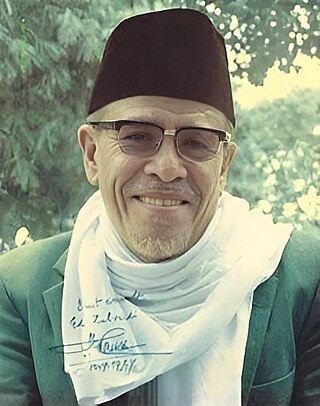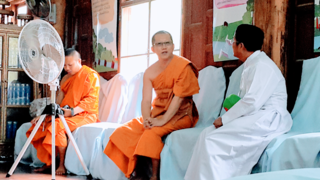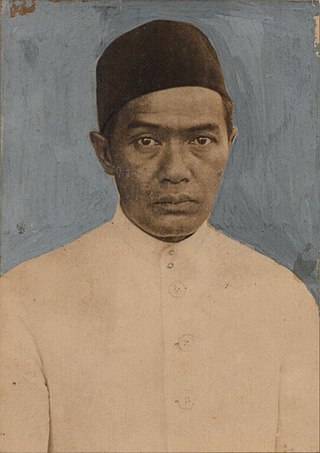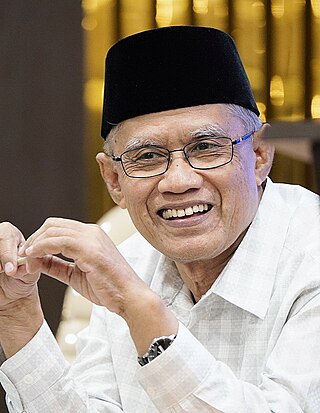
Nahdlatul Ulama is an Islamic organization in Indonesia. Its membership numbered over 95 million in 2021, making it the largest Islamic organization in the world. NU is also a charitable body funding schools and hospitals as well as organizing communities to help alleviate poverty.

Islam is the largest religion in Indonesia, with 87.06% of the Indonesian population identifying themselves as Muslims, based on civil registry data in 2023. In terms of denomination, the overwhelming majority are Sunni Muslims; the Pew Research Center estimates them as comprising ~99% of the country's Muslim population in 2011, with the remaining 1% being Shia who are concentrated around Jakarta and about 400,000 Ahmadi as well.

Muhammadiyah ; officially Muhammadiyah Society is a major Islamic non-governmental organization in Indonesia. The organization was founded in 1912 by Ahmad Dahlan in the city of Yogyakarta as a reformist socioreligious movement, advocating ijtihad - individual interpretation of Qur'an and Sunnah, as opposed to Taqlid - conformity to the traditional interpretations propounded by the ulama. Since its establishment, Muhammadiyah has adopted a reformist platform mixing religious and secular education, primarily as a way to promote the upward mobility of Muslims toward a 'modern' community and to purify Indonesian Islam of local syncretic practices. It continues to support local culture and promote religious tolerance in Indonesia, while a few of its higher education institutions are attended mostly by non-Muslims, especially in East Nusa Tenggara and Papua provinces. The group also runs a large chain of charity hospitals, and operated 128 universities as of the late 1990s.

Kyai Haji Ahmad Dahlan, often abbreviated to K.H. Ahmad Dahlan, was an Indonesian Muslim religious leader and revivalist, who established the Muhammadiyah organization. Which would become one of the largest Muslim organizations in Indonesia, second only to the Nahdlatul Ulama. Born in Kauman, Yogyakarta, he was the son of an imam of a local mosque and traced his origins from the lineage of Muhammad. Ahmad Dahlan performed the Hajj pilgrimage when he was 15 years old, and he lived in Mecca for another five years.

Abdul Malik Karim Amrullah, better known by his pen name Hamka was an Indonesian ʿālim, philosopher, writer, novelist, lecturer, politician and journalist.

According to the 2018 census, Buddhism is the largest religion in Thailand, practiced by over 94% of the population; Islam makes up 5% of the population. The Thai government officially recognizes five religions: Buddhism, Islam, Hinduism, Sikhism, and Christianity.
Muhammadiyah University of Makassar, also known as Unismuh Makassar, is a private university located in the city of Makassar, Indonesia. As a private university, Unismuh Makassar is coordinated under Kopertis Wilayah IX, which is a government-funded institution that coordinates private higher education in Indonesia. Unismuh is accredited 'B' based on the National Accreditation Body (BAN-PT).

Indonesian Ulema Council is Indonesia's top Islamic scholars' body. MUI was founded in Jakarta on 26 July 1975 during the New Order era. The council comprises many Indonesian Muslim groups including Nahdlatul Ulama (NU), Muhammadiyah, and smaller groups such as LDII, Syarikat Islam, Perti, Al Washliyah, Mathla'ul Anwar, GUPPI, PTDI, DMI, and Al Ittihadiyyah. The Ahlul Bait Indonesia (Shi'ite) and Jemaat Ahmadiyyah Indonesia (Ahmadiyya) were not accepted as members.
The Daughters of St. Mary is a Coptic community of nuns based in Beni Suef, Egypt.

Siti Walidah, better known as Nyai Ahmad Dahlan, was a female emancipation figure, wife of Muhammadiyah founder Ahmad Dahlan, and National Hero of Indonesia.

Mas Mansoer was an Indonesian religious leader who served as the 4th chairman of Muhammadiyah from 1937 to 1942. He was declared a national hero by President Sukarno in 1964.

Fakih Usman was an Indonesian Islamic leader and politician of the Masyumi Party. He twice served as the Minister of Religious Affairs under the cabinets of Abdul Halim and Wilopo from January until September 1950, and again from 1952 until 1953. In his early years, Fakih was criticized by conservative Muslims for his involvement with the modernist Islamic Muhammadiyah organization, though he is remembered fondly by the group. Born to a merchant and his wife in Gresik, Dutch East Indies, Fakih studied with his father and at a series of pesantren until the 1920s.

Haedar Nashir is the leader of Muhammadiyah. He is among the 100 top social sciences scientists in Indonesia, and world’s 500 influential Muslims. He is also known as a professor and lecturer in the Governance Science program at Muhammadiyah University of Yogyakarta.
Siti Noordjannah Djohantini is a female Islamic scholar from Indonesia currently serving her second term as the leader of Aisyiyah, Indonesia's first all-female Muslim organization. She was elected to her second term as leader on 6 August 2015, the same day on which her husband Haedar Nashir was elected to his first term as leader of Muhammadiyah. She was also the co-founder of Yasanti, Indonesia's first female workers' rights NGO.
Siti Chamamah Soeratno is a female Islamic scholar from Indonesia and the former leader of Aisyiyah, Indonesia's first all-female Muslim organization. She is also the former dean of Muhammadiyah University of Malang and an expert on Indonesian literature. She has served as a faculty member at Leiden University, Mercu Buana University, Sebelas Maret University and Yogyakarta State University among others.

Islam Nusantara or Indonesian (Islamic) model is a term used to refer to the empirical form of Islam that was developed in the Nusantara. This term was introduced and promoted by the Indonesian Islamic organization Nahdlatul Ulama (NU) in 2015, as a rejection of Wahhabism.
In the context of Muslim society in Indonesia, Modernism or modernist Islam refers to a religious movement which puts emphasis on teachings purely derived from the Islamic religious scriptures, the Qur'an and Hadith. Modernism is often contrasted with traditionalism, which upholds ulama-based and syncretic vernacular traditions. Modernism is inspired by reformism during the late-19th to early 20th century based in the Middle East, such as the Islamic modernist, Salafiyya and Wahhabi movements. Throughout the history of contemporary Muslim Indonesia, these movements have inspired various religious organizations; from the mass organization Muhammadiyah (1912), political party Masyumi Party (1943), to missionary organization Indonesian Islamic Dawah Council (1967).
In July 2005, Indonesian Ulema Council (MUI), a semi-official Islamic clerical body of Indonesia, issued a fatwa, or an Islamic legal opinion, against religious pluralism, liberalism, and secularism. The issuance of fatwa garnered substantial controversy and scholarly attention. The fatwa addressed the reformist trend of Islam which had been popular among the broad Indonesian society over the past 25 years. Such trends advocated for a more substantive reading of the Quran and Hadith, instead of literalist approaches taken by the majority of ulamas. MUI considered such ideas as incompatible with Islamic teaching, releasing the fatwa to promote a more literal reading of the Islamic scriptures. The fatwa was heavily criticized by progressive Muslim intellectuals.

Wahdah Islamiyah is a Salafi Islamic mass organization (ormas) based in Makassar, South Sulawesi, Indonesia. The organization emerged in the late-1980s and today it owns approximately 120 branches across the archipelago. Wahdah maintains an extensive cadre training system and runs more than 200 schools, including its own higher educational institutions. The organization has a long history of cooperating with the local government through the provision of social welfare and religious education.

Rahmah el Yunusiyah was a Dutch East Indies and Indonesian politician, educator, and activist for women's education. Born into a prominent family of Islamic scholars, she was made to leave school in order to get married as a teenager. After a few years of marriage, el Yunusiyah obtained a divorce and returned to her education.
















